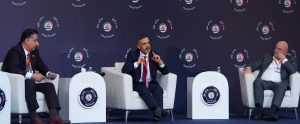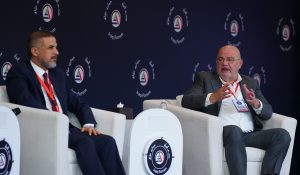- Mohammed Ali Timim, Minister of Planning
- Mohammed Al-Najjar, Advisor to the Prime Minister
- Mohammed Al-Egaily, Al-Nahrain Centre for Strategic Studies (Moderator)
Iraq requires an achievable and practical long-term economic vision and strategy, and it is an urgent necessity to identify what makes Iraq unique in its industrial and agricultural economy, especially in areas where Iraq can compete with other countries in the region.
The country’s private sector has still not been fully realised, regulated or empowered to lead Iraq into the growth and prosperity its population deserves. Red tape and complex bureaucracy in the country’s state institutions has also prevented the completion of projects and increased the reluctance of international companies to contribute to private reconstruction efforts.
The government has a role to play, and so too to foreign and domestic industries, who would benefit from engaging with the increasing numbers of young professionals in Iraq keen to start-up and develop small and medium-sized enterprises (SME). In this panel, the Minister of Planning, Mohammed Ali Timim, and Mohammed Al-Najjar, an advisor to the prime minister, considered the structural challenges and solutions for diversifying the economy, social investments, and incentivising the private sector in Iraq.

The panel began with an obvious acknowledgement on the vulnerabilities Iraq faces, linked to its recent history, political and security issues, and climate threats. “Iraq is one of the most vulnerable countries when it comes to climate change,” Timim said. “I can comfortably say that for the first time, the public central budget has tackled the issue of water issues, desertification, and sustainable development goals, and there is lots of budget and funding allocated for this, hoping to achieve this,” he added.
Questioned by Al-Egaily on the allocated budget for sustainable development, which he told the audience he had seen little about in Iraq’s budget so far, Timim said that there may be confusion with the terminology, as the word for climate change is different to sustainable development. Nevertheless, he stressed that the government was committed to reducing gas flaring, gas emissions, and finding alternatives for clean sources of energy. “We are about to launch a new project in the next few months to take steps,” Timim said, promising details on this in the near future.
Asked about the public sector and private sector approach to the economy, the Prime Minister’s advisor Mohammed Al-Najjar responded that, “Iraq’s economic model was launched in 1924, since the marketing of oil, and over the following 100 years we have increased our reliance on oil and we cannot carry on with a 100 year old economic model.” Al-Najjar acknowledged that oil has shifted Iraq’s economy into a rentier economy, and there was a clear need for more tangible things in the country, like bridges, roads, and electricity. He made the point that Iraq doesn’t conduct feasibility studies. “It’s challenging to live in Iraq,” he said. “We need to start action immediately, and we have a good government now, but we don’t have a clear plan. Since 2003 to now, we have had no clear idea for an economic identity.”

Previously, Al-Najjar said, the country’s political orientation was focused on everything other than the economy. Questioned on the country’s Development Fund, Timim added that this has created more than 200 schools. “The fund is still there,” he said. “It is an important fund that has established cooperation with companies.” Addressing Iraq’s Five-Year Plan, he told the audience that, “A budget for three years has taken 60% of the five-year plan… we have identified the areas for implementation. Even if we don’t talk about a five-year plan, then we will be talking about a ten-year plan. The ministry of planning is exerting serious efforts,” he said. Pushed on the impact of the plan and the auspices of the ministry, Timim told the audience that, “We want to bring back the glory days of Baghdad…The investors of the world have many challenges [and] the state is working to catch up with the change that is needed.”
Iraq Forum: For Stability and Prosperity
3/05/2023
Session 2: Investment & Diversification: Transforming Iraq’s Economy
Session video
Session Video

